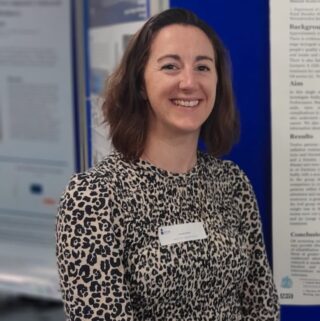Sinead Rothrie
 Sinead is a Speech and Language Therapist who specialises in head and neck cancer at the Royal Marsden Hospital. She is interested in improving follow up services for people following treatment for head and neck cancer. She observed that longer term issues arising from treatments, such as ongoing difficulties swallowing, are often not discussed in detail, despite having the potential to substantially reduce quality of life. Sinead wanted to look at the experiences people were having, but found there was a lack of evidence around these ongoing quality of life concerns.
Sinead is a Speech and Language Therapist who specialises in head and neck cancer at the Royal Marsden Hospital. She is interested in improving follow up services for people following treatment for head and neck cancer. She observed that longer term issues arising from treatments, such as ongoing difficulties swallowing, are often not discussed in detail, despite having the potential to substantially reduce quality of life. Sinead wanted to look at the experiences people were having, but found there was a lack of evidence around these ongoing quality of life concerns.
In this context, the Humanising Care Fellowship provided an opportunity for Sinead to develop a greater understanding of people’s experiences, and to use EBCD to co-design services that could help improve them. Her goal was to embed patient and staff experiences within her ongoing service improvement work.
Research
During her Fellowship, Sinead conducted a service evaluation and created a steering group to help deliver co-design work. She underwent EBCD training with the Point of Care Foundation team. Her Fellowship project evaluated follow up care services, using the EBCD methodology to capture the experiences of patients and professionals. She then brought them together for a celebration event, along with other professionals from the multidisciplinary team, and senior leaders from other services. Three co-design groups formed from the meeting are taking work forward which will report in September 2025.
Sinead shared her findings with the board of the Royal College of Speech and Language Therapists, and contributed articles to the RCSLT bulletin. She also publicised the work on the Cancer Voices platform to encourage collaboration at Marsden and elsewhere. She presented the work at conferences, with abstracts accepted at Dysphagia Research Society in Philadelphia, and the British Association of Head and Neck Oncologists (BAHNO) where she won an award for best oral presentation. All the presented work discussed how to embed patient experience in post treatment follow up care.
Impact
The learning and development gained through the Fellowship resulted in improvements in Sinead’s own practice, reinforcing the need to humanise care. Leadership of the project helped her to develop leadership and management skills. She has since been promoted to a leadership role within her team, giving her an opportunity to embed learning from this project into ongoing work.
A key take-away from the Fellowship is that services need to address the wider quality of life concerns of patients during follow up care, including an annual review of post-treatment effects. In this way a better long-term picture can develop to support conversations with patients about their care options. The dissemination work that Sinead carried out through the Fellowship has reached colleagues within the Royal Marsden and across the SLT profession, so these ideas can inform other cancer care services.
In future, Sinead hopes to extend the learning from this project into further activities, and she is looking for funding opportunities. The co-design method used in this process will be embedded in future projects.
Link: